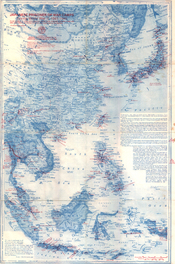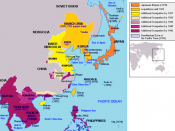Imperialism is the imposition of one nation's government, culture and economic needs on another nation or territory. In Japan, imperialism meant the desire to form an expansionist policy on the nations and areas surrounding it. Although Japan's main imperialist aims were endeavoured during the Second World War, their imperialist ambitions are evident from as early as 1894, during the Sino-Japanese War with China where it gained much influence in Manchuria and Shandong. In 1895 Japan took control of the island of Formosa (modern day Taiwan), in 1905 Japan seized control of Karafutu from the outskirts of Russia, and in 1910, after victory in the Russo-Japanese War, Japan annexed Korea, which became part of its Empire.
After Korea had been obtained, Japan embarked on the creation of a Japanese Empire on the Asian Mainland.
Despite these gains in territory made, a naval meeting known as the Washington Conference, put pressure on Japan from western nations to withdraw from Taiwan and Manchuria.
Japan agreed to do this, but was extremely bitter over the agreement as it meant the loss of all their previous military gains over the last years. On top of this, in the Exclusion Act of 1924, the USA passed a law denying Japanese citizens the right to immigrate to America. These blows to Japan sewed the seeds of discontent which helped form the ultra-nationalistic and imperialist ideals of Japan. Japan began to feel that she was the defender of the Asian peoples against Western agression.
At this time, Japan was finally beginning to be recognised as an important naval power, and her desire to achieve world power status called for an expansionist policy. National greatness was associated with colonial expansion.
There were many reasons why Japan employed imperialist policy.
Japan's population had nearly doubled since 1873, and by 1930...


